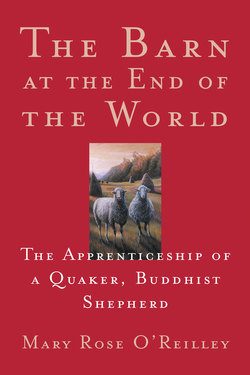Читать книгу The Barn at the End of the World - Mary Rose O'Reilley - Страница 23
На сайте Литреса книга снята с продажи.
ОглавлениеAcceptance of the Present
IT WAS LAST APRIL in the north of England, one of those moments when it felt like I’d been traveling for about thirteen years, jazzed on homeopathic fright pills. I was telling myself that yoga is at root a practice of acceptance: acceptance of the body from moment to moment, day to day; people, situations, and events as they occur. Softening to whatever comes. I was having these thoughts while trying to surrender to a chilly bed in Birmingham, at a community where I was doing research. The mattress was the kind of penitential hump with a ridge running down the middle that forces you to deposit half of your body east and half of it west, divided precisely in two lest one side overbalance and you slide to the floor. The damp cold seeped into me as I lay watching the dark like a cat at God’s mousehole. Part of me delivered rational comfort: it will be warm in a minute, I’ll be asleep. Another part wailed, “There’s been a mistake! I’ve been buried alive in Birmingham, and this is the cold of a deep grave I can’t whine my way out of!”
Yoga mediates between these two voices. This moment is as it should be. This moment is my teacher. If I struggle against this moment, I struggle against the flow of the universe.
Finally I got out of bed and found my long underwear and a stash of those overwashed community blankets that lie on you like tacos, letting in drafts from all sides. I hoped the homeopathic fright pills were specific for being buried alive. Then I slept or fell down a coal chute till 5 A.M. truck traffic on the Bristol road committed me to the day. The pillow jammed under my head repulsed me with its smell of exotic hair oil, male and tropical. I pushed off the hump and made for the shower. The water was lukewarm, and I caught, shivering, the scent of a peculiarly British brand of disinfectant. Olfactory sensations go right to the glands of memory; I was back in an English youth hostel, adventurous, displaced, and twenty-four. On the skylight above me a spongy, plopping sound began and I sensed the peculiar light of snow.
But I was not twenty-four, I was unstuck in time, and in a few hours I was due to be in Manchester to meet the man who has been the companion of my life for some fifteen years.
The one given me to love, I think, fondly—sometimes—when he drops his socks on the floor. For to have someone to love is worth the price of admission to life; not even Birmingham could shake my soul on that point. Robin and I met in church, as Abby Van Buren recommends, or rather at Quaker meeting. And then we met again, singing. Both of us belong to a group that sings in a colonial American tradition called Sacred Harp or shape note. In fact, it’s music business that brings Robin to England: he will be teaching Sacred Harp singing to English choral groups and directing a national convention. Let me try to give you a picture of how strange it will be to transplant this raucous, unsubtle music into the ironic idiom of British choral singers.
